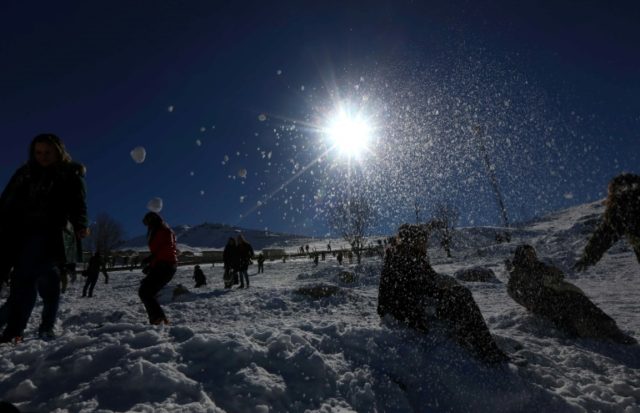Korek resort (Iraq) (AFP) – In the fledgling ski resort of Korek in war-torn Iraq, the only battles are snow fights between visitors who often leave their traumatic memories at the foot of the slopes.
That’s what Fawaz Behnam and many of the children and adults frolicking in knee-deep powder around him like about the idyllic tourist spot.
He and his family were in Mosul when the Islamic State group seized the city in 2014, forcing them to flee, leaving their home and their jewelry shops behind.
“We were very tired and we want to have some fun. Look at the people here enjoying themselves, not like in Mosul,” said the 35-year-old, his face flush from the bright sun and cold wind.
Korek lies in Iraq’s northern autonomous region of Kurdistan, where hundreds of thousands of Iraqis displaced by the 2014 jihadist offensive have found refuge.
“You can see the great atmosphere,” said Behnam’s brother-in-law Anmar Munir, a young accountant who also lives in the Kurdish city of Dohuk, further west.
“People are relaxed and enjoying themselves. This of course takes us away from the atmosphere of murder, displacement and persecution,” he said.
About 120 kilometres (75 miles) to the west, Iraqi forces have spent the past four months battling jihadists to retake Mosul, IS’s last major stronghold in the country.
Fawaz and Anmar are among the luckiest displaced who can afford to travel to Korek but hundreds of thousands are spending their third winter in displacement camps.
– Frontier destination –
At a snow festival organised in Korek by the regional government last week, groups of young people, some in proper winter attire but many wearing flimsy city shoes, broke into traditional dance and enjoyed some of the activities available there.
Dozens queued for a ride on a Zip-line, others raced each other on sleds and the most adventurous signed up for their first skiing class on a baby piste — but the most popular sports remained snow fighting and selfie snapping.
Nader Rusty, a spokesperson for the regional government’s tourism ministry, has other ambitions for Iraq’s only mountain resort than just offering relief to victims of conflict.
“We organise this snow festival every year. It’s very important to improve tourism in general and winter tourism in particular,” he said.
Conflict-torn Iraq is best known for its searing temperatures and not exactly a tourist magnet but Korek is hoping to make a name for itself as a frontier skiing destination.
2014 was supposed to be a takeoff year for Kurdistan’s tourism industry and Korek was one of its flagship projects.
However the devastating human and economic impact of the IS offensive that year and the subsequent war to retake lost territory left Kurdish dreams in tatters.
“Our target was seven million (tourists) by 2025 but because of the war, our plan has changed,” said Nader Rusty.
– Haven –
For now Korek lacks a ski lift but it boasts a state-of-the-art Austrian-built cable car and swanky chalets.
James Willcox, a cofounder of adventure travel company “Untamed borders”, was in Korek for the snow festival with a group he believes was on the first ever commercial skiing trip to Iraq.
“We were skiing nearer to Haj Omran, where the mountains are bigger and we were lucky that there has been lots of snow this week,” he said.
“So we took one day to come here to ski, to listen to the music, to eat and to enjoy the festival,” said Willcox, who also organises holiday trips to places such as Somalia and Chechnya.
Rohan Lord came all the way from New Zealand to ski in Iraq.
“The skiing is fantastic. The snow is fantastic. The hospitality has been brilliant,” he said. When asked about the conflict unfolding in Iraq, he said: “We were nervous, there’s no doubt about it.”
For Mohammed Ghanem, a student from Fallujah — a city west of Baghdad which Iraqi forces retook from IS jihadists last year — the main appeal of Korek is precisely its remoteness from war.
“There is no nature like this (in Fallujah), nor any such safety. There are only explosions. You never feel safe and when you go out you are scared of car bombs or of being detained,” he said.

COMMENTS
Please let us know if you're having issues with commenting.